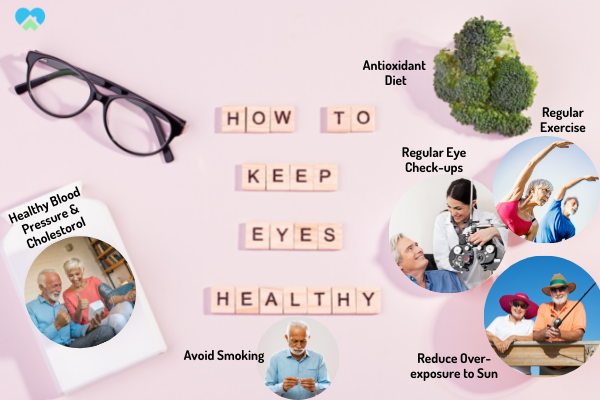Age-related macular degeneration (AMD) can blur your central vision by damaging the macula in the retina. It develops a black spot at the center of one’s vision. Even though it doesn’t affect peripheral vision, AMD makes it difficult to recognize faces, watch TV, read a book, drive a car, and so on. Gradually, AMD can even cause blindness if not detected and treated early. Unfortunately, AMD can have a drastic impact on one’s overall health and wellbeing.
Types of Age-Related Macular Degeneration
There are two types of macular degeneration: Dry AMD (Atrophic) and Wet AMD (Neovascular). In dry AMD, yellow deposits known as drusen form under the macula that eventually leads to vision loss. In wet AMD, the abnormal blood vessels growth creates a scar on the macula leading to rapid loss of central vision. Most people, about 90%, with macular degeneration have dry AMD. The vision loss from dry AMD happens slowly unlike wet AMD where the damage is rapid.
Causes of Macular Degeneration
The actual pathogenesis of AMD has not yet been established. However, they think it is related to oxidative stress and severe exposure to light. Scientists discovered that AMD is linked to genes and ethnicity as well. Family history, prolonged exposure to sunlight, smoking, high blood pressure, damaged blood vessels, and obesity may also all lead to macular degeneration.
Signs and Symptoms of Macular Degeneration
Signs and symptoms of Age-Related Macular Degeneration develop gradually and are not noticeable until an individual experiences a problem with their eyesight.
The first symptoms of AMD include:
- Reduced or blurry vision at the center in one or both eyes
- Visual distortion – Lines appear wavy
- Dark spots in the center
- Colors can fade in a few cases
- Letters might disappear suddenly when reading
- Difficulty in adapting to dimly lit places
How to Prevent Macular Degeneration
Anti VEGF treatment is available to reduce or reverse wet AMD but there is no effective treatment for dry AMD. Diet and lifestyle changes can slow down or prevent Age-Related Macular Degeneration. Therefore, as the saying goes, “prevention is better than cure.”

Reduce Over-exposure to Sun:
Excessive exposure to sunlight and ultraviolet rays can increase the risk of developing AMD. Sunlight is good for getting vitamin D naturally, but it is important to avoid over-exposure to it. Ensure the eyes are protected from ultraviolet rays by always wearing sunglasses. Also, make sure that the sunglasses offer protection from both UVA and UVB rays that are harmful to the eyes.
Regular Exercise:
Regular exercise is good for overall health and can also be beneficial in preventing macular degeneration that develops with age. Recent scientific research has shown that a physically active lifestyle with exercise reduces the risk of developing AMD three times. Exercise improves blood circulation, reduces inflammation, and helps with other problems associated with the walls of the blood vessels. There is strong evidence that inflammation plays a role in developing AMD and that exercise lowers the risk.
Pack your Diet with Antioxidants and Cut down on Carbs:
Antioxidants prevent the damage of cells by fighting free radicals and reduce oxidative stress. As AMD occurs due to oxidative stress on the retina, a diet packed with antioxidants is the best way to combat this disease. Add dark green leafy vegetables, green peas, Brussel sprouts, broccoli, asparagus, and carrots to your regular diet. These foods are rich in carotenoids and flavonoids that are good for overall eye health.
Consuming food made of simple carbs regularly can push you into the risk zone of developing AMD. These carbs are high in Glycemic Index (GI) and increase inflammation in the body. Limit the simple carbs in your regular diet and replace them with complex carbs such as whole grains, fiber-rich fruits, and vegetables.
Maintain Healthy Blood Pressure and Cholesterol:
High blood pressure restricts blood flow to the choroid, the vascular layer of the eye. It accelerates the progression of AMD and may lead to wet AMD. Lifestyle changes, weight loss training, meditation, yoga, and even medications keep the blood pressure in control.
High cholesterol is also the potential cause of AMD. Studies have proven that cholesterol laden diets accumulate cholesterol in the retina and can result in degeneration by ultimately leading to AMD.
Avoid Smoking:
Smoking is one of the major risk factors for AMD. Cigarette smoke has many harmful toxins that can cause oxidative damage to the macula. Also, smoking doubles the risk of AMD. Smoking Cessation can prevent blurring of your vision and A healthy eyesight.
Regular Eye Check-ups:
Early detection is the key to slowing down or managing this age-related eye disease. Regular eye check-ups should be a part of the health regime while getting older. After the age of 65, assess your eyes from time to time, even if your vision is clear. Monitor your vision with a self-help test through the Amsler grid. Autofluorescence, ophthalmoscopy, digital retinal imaging, fluorescein angiography, and optical coherence tomography which can diagnose AMD.
Best Vitamins for Macular Degeneration Prevention
Studies show that nothing can replace an eye-healthy diet and lifestyle when it comes to preventing macular degeneration. However, taking a mix of nutritional supplements under medical advice can also reduce the risk of developing advanced AMD or wet AMD. Taking such supplements can even delay or prevent vision loss in the second eye. A study found that taking nutritional supplements daily as prescribed by ophthalmologists or radiologists can lower the risk of advanced AMD or wet AMD. The following are the best vitamins for macular degeneration prevention.
- Vitamin C
- Vitamin E
- Lutein
- Zeaxanthin
- Zinc (as zinc oxide)
- Copper (as cupric oxide)
Home Care for the Elderly with AMD
AMD is common among seniors over the age of 60 and is also the main cause of vision loss in them. The numbers keep rising with the increase of life span due to medical advancement. As seniors sometimes confuse the conditions of AMD with cataracts and glaucoma, they need expert support and guidance at home. Choosing a credible home care service provider is the best option to keep your loved ones with AMD safe at home.
Assured Home Nursing is a reputable, in-Home care service provider offering a spectrum of services for seniors to age gracefully in the comfort of their own homes. Assured Home Nursing is equipped with a passionate team of experienced caregivers who look after loved ones 24 hours a day and 7 days a week.
Feel free to call us for a free consultation@ (248) 593-8134. Our team is available 24 X 7 to help you out!


